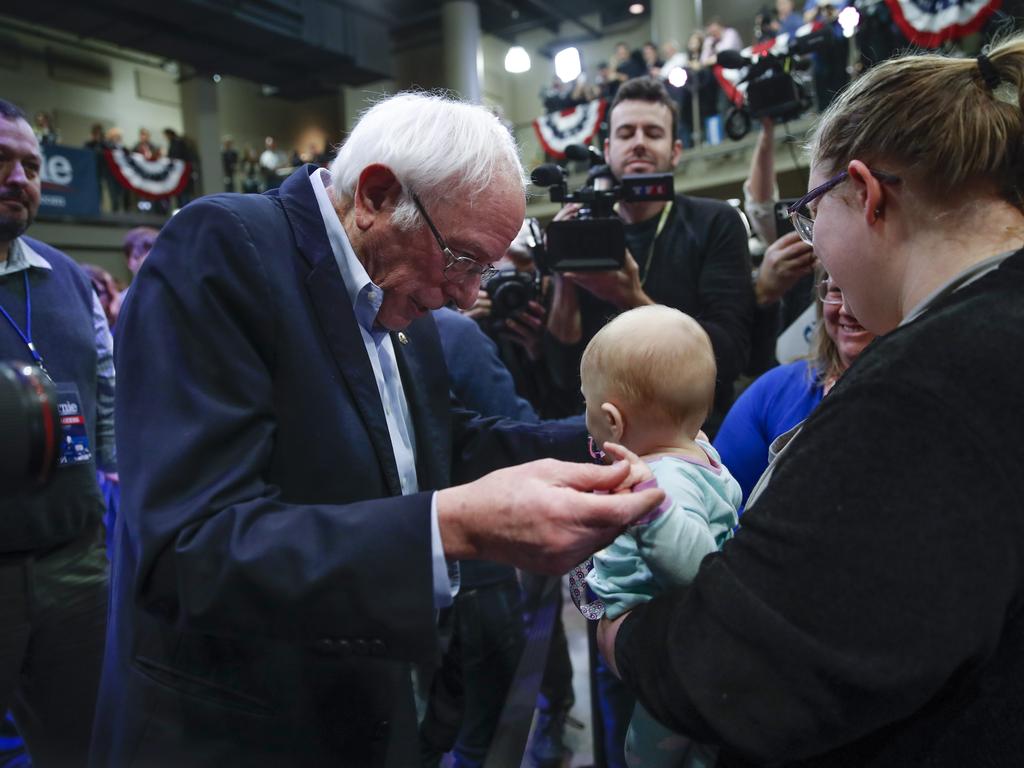Donald Trump impeachment pointless ahead of US presidential election
Impeachment of the US President has had virtually zero impact in the court of public opinion.

Throughout the Senate trial Murkowski kept her own counsel and weighed her options until she finally joined fellow moderate Republican Lamar Alexander in opposing new witnesses in the trial. In doing so over the weekend Murkowski and Alexander guaranteed the swift conclusion of the trial and the final vote on Thursday (AEDT), which will acquit the US President.

But Murkowski hardly basked in the glory of the moment for her party. Instead, the senator from Alaska let rip at both sides of US politics.
“It is sad for me to admit that, as an institution, the congress has failed,” she said. “We have already degraded this institution for partisan political benefit … We are sadly at a low point of division in this country.”
They were bitter words, but not inaccurate. For just over four months Americans have been dragged through one of the ugliest of political spectacles.
Each side — the Democrats, the Republicans and the President — fought day and night to prevail and yet each has emerged tarred and diminished by the impeachment saga.
Acquittal inevitable
In the end, it will finish where everyone expected. The Democrat-controlled House impeached the President and the Republican-controlled Senate will almost certainly acquit Trump on Thursday, largely along party lines.
Trump now sits in history with an asterisk next to his name as only the third US president to be impeached and yet it is unlikely to be an impediment as he seeks re-election in November. It may even prove a political bonus for him.
For the Democrats, it’s hard to see how the saga has helped them. They did highlight the President’s unethical behaviour with Ukraine and they symbolically tarnished Trump’s legacy with a politically partisan impeachment.
But otherwise the progressive party’s big gamble has failed in exactly the way Democrat House speaker Nancy Pelosi foreshadowed last year when she initially argued that a politically partisan impeachment would be pointless.
Democrats had hoped that in proving Trump abused his power by pressuring Ukraine to investigate his opponent, Joe Biden, they would stir public opinion against the President. Along the way, Democrats hoped they would also win over a few Republicans to vote for his impeachment, although they knew there was never any realistic chance that the Republican-controlled Senate would vote to remove him from office.
But, while Democrats made a convincing case that Trump acted wrongly in the Ukraine controversy — which a growing number of Republicans eventually accepted — there was a lack of public conviction that it was an offence worthy of being removed from office.
As such it had almost zero impact on public opinion, which remained split along party lines.
While Democrat voters overwhelmingly want Trump removed from office, probably as much for other reasons as for the Ukraine, the vast majority of Republican voters either did not believe the evidence or did not see Trump’s actions as an impeachable offence.
For congressional Republicans and for the President’s lawyers the fight against impeachment has been tricky to navigate. Their room for manoeuvre was limited from the start by Trump’s insistence that he did nothing wrong and that his July 25 phone call with Ukrainian President Volodymyr Zelensky was “perfect”, even though the transcript of that chat showed the US leader asked his counterpart to investigate Biden.
The key Republican tactic through all of the House impeachment inquiry, and for the first half of the Senate trial, was to focus on — and deny — there was a so-called quid pro quo between Trump’s decision to withhold $US391m ($583m) in US security aid to Ukraine and his desire that government investigate Biden and his son, Hunter.
It was a tough argument to make. Numerous serving and past officials in the State Department and Defence testified that there was no reason given as to why the aid was abruptly frozen and the only logical reason was to pressure Ukraine on the Bidens.
Acting White House Chief of Staff Mick Mulvaney all but admitted this in a news conference before he recanted.
Even Trump’s ally in the middle of the Ukraine affair, diplomat Gordon Sondland, said there was a quid pro quo and that he “presumed” aid had been frozen to pressure Ukraine about the Biden request.
But, despite the weight of circumstantial evidence, Republicans could credibly argue there was no testimony that directly linked the President to a quid pro quo between aid and the Bidens.
Bolton’s bombshell
That argument crumbled abruptly last week when former national security adviser John Bolton claimed, in the draft of his new book, that Trump told him directly he wanted to withhold aid to Ukraine until it aided investigations into the Democrats, including Joe and Hunter Biden.
Republicans panicked at the news. Bolton’s claims were the “smoking gun” that undermined their defence of the President. The revelations fuelled the argument that new witnesses, including Bolton, should give testimony. Having argued there was no direct evidence of a quid pro quo, it was going to be hard for Republicans to refuse to call a witness who claimed to have direct evidence.
Republicans had always opposed new witnesses at the trial because they already had the numbers to easily acquit the President and did not need to inject the uncertainty of new testimony into the proceedings.
Democrats cried foul, pointing out that the two previous Senate trials of presidents — Bill Clinton in 1999 and Andrew Johnson in 1868 — had witnesses. But the US constitution has few guidelines on how to conduct impeachment trials. With the numbers on his side, Republican majority leader Mitch McConnell was free to structure his trial as he saw fit.
Ironically, the Bolton bombshell prompted the President’s legal team to pivot its strategy to win over those Republican moderates who were wavering on the question of calling new witnesses.

When the Bolton claims were leaked, Trump’s lawyers began to focus less on what the President did, but on whether his actions rose to the level of an impeachable offence. “Nothing in the Bolton revelations, even if true, would rise to the level of an abuse of power or an impeachable offence,” Trump lawyer Alan Dershowitz told the Senate.
Suddenly, Republicans had an argument they could use to justify not calling Bolton as a witness.
This legal pivot had an immediate impact. “Let’s say it’s true, OK?’ Republican senator Mike Braun said. “Dershowitz last night explained that if you are looking at it from a constitutional point of view, that is not something that is impeachable.” While many Republican senators were persuaded by Dershowitz’s arguments, the key question was whether the four Republican moderates the Democrats needed to win the vote on new witnesses would fall in line.
Moderate senators Susan Collins and Mitt Romney had already flagged that they would vote for witnesses, meaning the ballot hinged on Alexander and Murkowski crossing the floor.
Alexander and then Murkowski shot down the Democrat hopes by revealing ahead of the vote, they would oppose new witnesses.

In explaining his decision Alexander gave what may be the most sensible appraisal of the whole impeachment process by either side.
“It was inappropriate for the President to ask a foreign leader to investigate his political opponent and to withhold United States aid to encourage that investigation,’ Alexander said. “When elected officials inappropriately interfere with such investigations, it undermines the principles of equal justice under the law. But the constitution does not give the Senate the power to remove the President from office and ban him from this year’s ballot simply for actions that are inappropriate.”
Over to the voters
In other words, Trump’s actions, while wrong, should not overturn the results of the 2016 general election and impact on the forthcoming election. Voters will be free to punish Trump or not depending on how much they care about the whole Ukraine affair.
In the end, senators opposed new witnesses by 51 votes to 49, with only two Republicans — Collins and Romney — voting with Democrats. The result underscored just how closely Republicans have stuck by the President through the impeachment saga.
Faced with Trump’s certain acquittal this week, Democrats have discredited the trial as a sham, arguing it isn’t really an acquittal. “He will not be acquitted,” Pelosi said. “You cannot be acquitted if you don’t have a trial. You don’t have a trial if you don’t have witnesses and documentation.”
Trump is already using impeachment to fire up his base and paint himself as the victim of a partisan witch hunt by a Democratic Party that wants to overturn a fair election. “They want to nullify your ballots, poison our democracy, and overthrow the entire system of government. That’s not happening,” Trump told a rally in Des Moines last week.
The final vote on Thursday is expected to fall almost entirely along party lines. On the Republican side Collins and Romney could potentially vote for Trump’s removal while on the Democrat side, moderates Doug Jones and Joe Manchin, who hail from pro-Trump states of Alabama and West Virginia, are considered a chance to break from their party to vote against his removal.
Either way, the Democrats are not even close to getting the two-thirds majority required to remove Trump from office.
So the vote on Thursday, the day after Trump delivers his State of the Union address, will finally end this impeachment, the most partisan in US history. Then the election campaign begins in earnest and it will be up to the American voters to decide whether all of this has made any difference.
Cameron Stewart is also US contributor for Sky News Australia








US senator Lisa Murkowski was one of the four moderate Republicans who held the decisive votes on whether to call new witnesses and prolong the impeachment trial of Donald Trump.